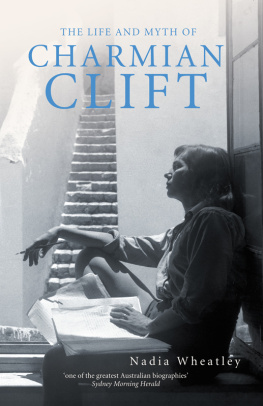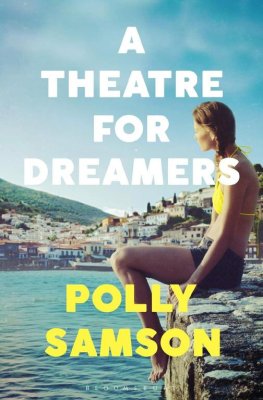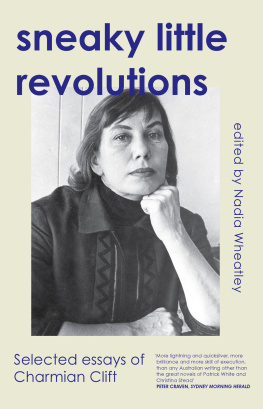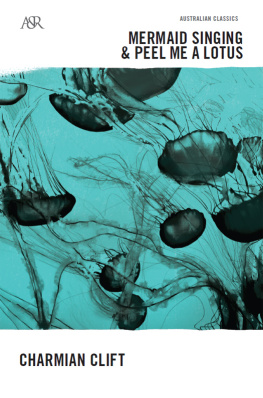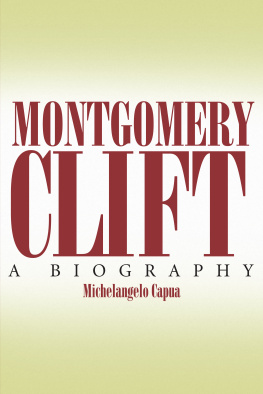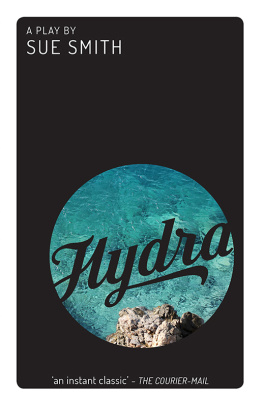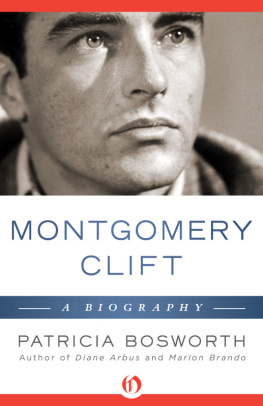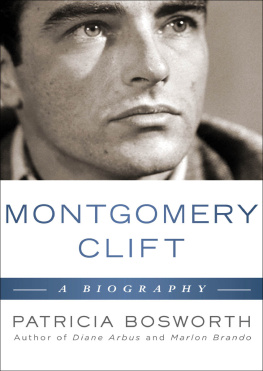If the fixture of Momuss glass in the human breast, according to the proposed emendation of that arch-critic, had taken place, [ ] nothing more would have been wanting, in order to have taken a mans character, but to have taken a chair and gone softly, as you would to a dioptrical bee-hive, and looked in, viewed the soul stark naked; observed all her motions, her machinations; traced all her maggots from their first engendering to their crawling forth; watched her loose in her frisks, her gambols, her capricios; and after some notice of her more solemn deportment, consequent upon such frisks, &c then taken your pen and ink and set down nothing but what you have seen, and could have sworn to: But this is an advantage not to be had by the biographer in this planet.
T his story is fiction. The characters do not exist, nor did the incidents occur, excepting in my imagination. Thus Charmian Clift, in the Authors Note for her novel Honours Mimic, distanced herself from any obligation to defend the truth of her tale. Her husband George Johnston, in the note to his autobiographical novel My Brother Jack, took a somewhat different stance by way of quoting the French writer Andr Gide: Fiction there is and history. Certain critics of no little discernment have considered that fiction is history which might have taken place, and history fiction which has taken place. In regard to the work at hand, it would be amusing to follow Clifts line that This story is fiction, but maybe more true to paraphrase Gide: in the case of Charmian Clift and George Johnston, biography is fiction which has taken place.
Where, then, lies the truth?
In this book I try to keep myself off the page. I never met Charmian Clift or George Johnston, and I was not present during any of the incidents that take place in this account. Everything I know comes from interviews; from written texts ranging from letters to fiction (published and unpublished) to secondary sources; and I have to admit it from my imagination. Like any historian, I am sometimes forced to make deductions in order to fill in the spaces that lie between the available sources. As obviously all the opinion in this book is mine, it seemed unnecessary to state this at every point. Of course, this technique of the invisible narrator is an artifice: the writer is still, in fact, present on every page. However, as I am not overtly there for the reader to interrogate, it seems only fair that I start by declaring my hand, in regard both to my relationship with the subject of this book, and to my historiographical approach. This is particularly the case because, while my viewpoint on the events is mainly that of an outsider, at times I had, willy-nilly, a bit of an inside view. To explain this, I have to begin with something of my own story.
In my second year at Sydney University, in 1967, I found myself in a weekly English Honours seminar in which among the fifteen or twenty other students there was a very tall and very thin young man with long dark hair and long white hands. He always wore black skivvies and black trousers and he sat beneath the arched Gothic window of the seminar room and incessantly smoked black Sobranies. It seemed as if the tutor spent the whole session eliciting this particular students opinions on the required reading for the week, and this young man would answer in a light, precise voice, and these answers would be pedantically erudite, and once he gave them, none of the other students would ever dare disagree. At the end of each seminar, as I was leaving, I would hear the tutor talking to this young man about some latest thing that his parents had written, or perhaps some thing which had been written about his parents.
I could not help but be aware that this students father had published a highly acclaimed novel called My Brother Jack, which I hadnt got around to reading. Id somehow also missed the television serial of the same name, which had gone to air on Saturday nights towards the end of 1965; perhaps, like many other young Australians, I had been watching the Mavis Bramston Show, which was on at the same time. Although I didnt know that this students mother had written the script for the TV show, I did know that she wrote a weekly column in the Sydney Morning Herald . So infuriated was I, however, by something about the young man that I did not read his mothers column. If I wouldnt read things by these writers, I also wasnt going to read about them; and so, over the next few years, although I was generally aware of the lives and then the deaths of Charmian Clift and George Johnston, I did my best to avoid information about this family. Somehow, the whole media thing really annoyed me; it was (I realise now) the Clift/Johnston myth that I loathed.
Over these years, the student himself abandoned university, and became initially a journalist and later a scrounging freelancer, in order to support his habit of writing poetry. Meanwhile, I also escaped the English Department, and majored in Australian history. By the winter of 1972, I was enrolled in a masters degree when my circle of pub friends came to include a number of chess players, and through this I found myself sometimes sitting at the same table as Martin Johnston. I guess it helped that he was always totally absorbed in moving pieces around a board, for he didnt seem nearly as pretentious as the young man from the English Honours seminars. It probably also helped that he had changed from Sobranies to Alpine, although he still marked his individuality by having a dash of cloves in his beer. And as I was on a Commonwealth postgraduate scholarship and he was totally broke, I sometimes bought him a beer (with a dash of cloves), and he always thanked me in a way that was almost excessively polite. By the time summer came, we were living together.
Of course, something else happened in Australia in 1972, something even more momentous than a love affair. I mean, of course, the election of the Labor Government, which put an end to the conservative rule which seemed to have held the nation in thrall for two decades. Indeed, looking now at this story from the outside, and with the benefit of hindsight, I find a curious symmetry to the fact that it was in this year that marked the end of a political era that I came to know Martin and (by repute) his parents, for it was in direct response to the beginning of the Menzies period that Charmian Clift and George Johnston had left Australia and begun their expatriate life.
More immediately, for Martin, the election of the Whitlam Government offered the possibility of a years reprieve from the grinding poverty and drudgery of a freelance writers life. In 1973 the Literature Board of the Australia Council received increased funding, and a greatly enlarged program of grants was advertised. As just about everyone who had ever published a poem was going to apply, Martin decided that he would have a greater chance of success if he put himself forward in a different genre. Turning to the subject matter which was closest at hand, he volunteered to write a kind of memoir of his parents. I remember him talking about Edmund Gosses Father and Son as the sort of literary model which he had in mind. That is, his work would be a personal view from inside the family circle. At the time, I did not see as significant the fact that he chose a model which examines the relationship between two generations of men. This was quickly irrelevant, anyway, for when Martin actually received what seemed like the extraordinary sum of $5000, he embarked upon an experimental novel entitled Cicada Gambit.

